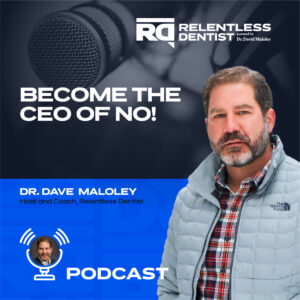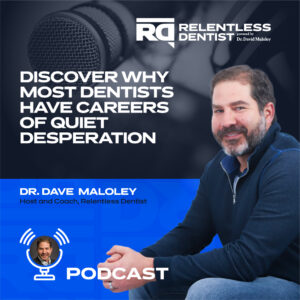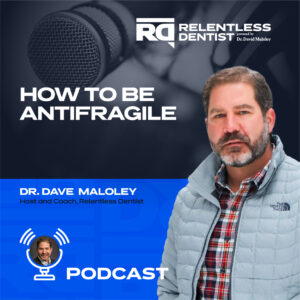by [email protected] | Apr 20, 2022 | Prescriptions for your Practice
Podcast: Play in new window | Download
 When deciding whether to do something, if you feel anything less than “Wow! That would be amazing! Absolutely! Hell yeah!” — then say no. — Derek Sivers
When deciding whether to do something, if you feel anything less than “Wow! That would be amazing! Absolutely! Hell yeah!” — then say no. — Derek Sivers
As a dental practice owner, a CEO, CFO, CMO, all rolled into one, saying NO is a leadership MUST! It sounds counter-intuitive at first, but speaking from personal experience, the moment I learned to say NO, that’s when my practice grew, my relationships fostered, and my personal, professional, and overall well-being optimized. Now, the question is, when do you say NO?
In this episode, I will discuss the gigantic costs of complexity in your dental practice. So if you want to hack away at the unessential, know when to say no, eliminate worry and low-value work so you can be a much more effective owner, tune in now! Are you ready to become the CEO of NO?
Tune in and find solutions to common practice issues at Prescriptions for Your Practice.
Key Quotes:
- “You are your number one asset.”
- “If things are breaking around you or you’re breaking or burning out, then the business fails.”
- “From a psychological and neurological standpoint, we have to train our minds to pursue the things that are important to us. And part of that cycle is a reward.”
- “The problem that we’re addressing is that Western culture assumes that more is better. Wealth is about money and positions only, and consuming creates happiness.”
- “There are great things that come with the trappings of success. There are great things with being able to splurge and have nice experiences and nice things. But those are, in fact, partial truths. We have to make sure that we’re not falling into the trap of that mantra of more is better, and money equals success. We need a more robust, durable solution. That’s the full truth.”
- “I have experienced it firsthand as a practice owner. I’ve never met a dentist that cut back days and regretted it.”
- “There comes a time in your career that you must say no to things that irritate and anger you and inhibit practice growth bottom line.”
- “Appreciate that saying no is hard. So expect grief when letting go.”
- “Saying yes to less is the way out.”
Featured on the Show:
- Book: The Art of Impossible: A Peak Performance Primer, Steven Kotler
- Book: The 50th Law, 50 cent, Robert Greene
- Book: Mastery, Robert Greene
- Book: The Shining, Stephen King
- People: Henry David Thoreau, essayist, poet, practical philosopher
- People: Steve Jobs, inventor, designer, entrepreneur, and co-founder of Apple Inc.
- People: Bruce Lee, actor, and martial arts professional
- People: Derek Sivers, entrepreneur, founder of CD Baby
- Podcast: Is There An Enemy In Your Midst?, Dr. David Maloley
- I appreciate your feedback. Let me know what you learned and loved here: [email protected].


by [email protected] | Mar 30, 2022 | Prescriptions for your Practice
Podcast: Play in new window | Download
 “Remember to be careful when following the masses; sometimes the “M” is silent.” — Anonymous
“Remember to be careful when following the masses; sometimes the “M” is silent.” — Anonymous
Today’s problem that we’re discussing is that we live in a society looking for bandaid solutions, quick fixes, and magic pills. These things lead to a lack of accountability, leading to a lack of results — which I call the commodity trap. I don’t want you to be in a situation chasing down the masses and living to someone else’s vision and version of success and live the rest of your life in quiet desperation. Step into the possibility that we can all choose a mastery path.
In this episode, I discuss why the masses are asses. So if you want to:
- elevate your practice owner confidence,
- avoid the pain of being a dabbler, obsessive, and hacker,
- be the most sought-after dentist in town,
- know how to prioritize your skill stack for fun and profit,
Listen now! This episode is for you.
Tune in and find solutions to common practice issues at Prescriptions for Your Practice.
Key Quotes:
- “Lots of dentists are worried about the commoditization of dentistry, but those same dentists likely aren’t de-commoditizing themselves and working on elevating their confidence.”
- “The first move to mastery is not outward but inward — Robert Green”
- “You feel called to do certain things, or you have unique skills or unique strengths that aren’t common. They might be easy for you and really hard for somebody else. And you might get frustrated at somebody else.”
- “What we’re looking for in a dental practice is complementary strengths, complementary life’s tasks that help us synergize.”
- “The path to mastery is a windy road. Our vocation is a windy road. It is not a straight line. And so, we have to engage on this journey.”
- “Leadership and marketing are the ways that you multiply yourself.”
- “If you want fulfillment, and you want more money, and you want a better lifestyle, then the operative word is grow.”
Featured on the Show:


by [email protected] | Feb 2, 2022 | Prescriptions for your Practice
Podcast: Play in new window | Download
 I’d rather be dumb and antifragile than extremely smart and fragile, any time. — Nassim Nicholas Taleb
I’d rather be dumb and antifragile than extremely smart and fragile, any time. — Nassim Nicholas Taleb
In this time of uncertainty, where do you find an anchor where you can draw strength to take on the challenges in your dental practice and push outside your comfort zone? We no longer live in a world of a predictable future. We need to become antifragile to become stronger as we face adversity.
This episode will talk about several ideas, tactics, and practices to help you become more antifragile and how you can fall in love with volatility. I will also share some examples of famous people taking on antifragile identity. Have you heard about Eleanor Effect? Listen in and learn how this can help you improve your day-to-day life.
Tune in and find solutions to common practice issues at Prescriptions for Your Practice.
Key Quotes:
- “They [comedians] were talking about how challenging writing sketch and standup comedy is today because people are so thin-skinned, and you can’t do any political humor without getting half the people off.”
- “If you can truly become antifragile, it’s an unfair advantage in the next five to 10 years for you as a practice owner.”
- “It’s a bad time to be a fragile practice owner, and even a robust practice owner will have challenges with the uncertainty and the volatility that’s been here for the last couple of years.”
- “An antifragile leader will create a higher level of confidence for himself and be the role model for an antifragile culture.”
- “We’re paid based on our ability to receive threats and turn them into solutions.”
- “It’s really beneficial to be very intentional about doing one thing that scares you every day.”
- “The future will get more and more unpredictable as we go on. So it doesn’t really benefit us to try and predict the future, but it does benefit us to be prepared for the future.”
Featured on the Show:


 When deciding whether to do something, if you feel anything less than “Wow! That would be amazing! Absolutely! Hell yeah!” — then say no. — Derek Sivers
When deciding whether to do something, if you feel anything less than “Wow! That would be amazing! Absolutely! Hell yeah!” — then say no. — Derek Sivers



 I’d rather be dumb and antifragile than extremely smart and fragile, any time. — Nassim Nicholas Taleb
I’d rather be dumb and antifragile than extremely smart and fragile, any time. — Nassim Nicholas Taleb